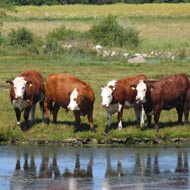Payment for farmers who prevent flooding

Farmers in areas prone to flash floods could be paid to convert pastureland to woodland.
Farmers who catch water on their land in order to prevent flooding in towns and cities may receive payment under new plans being considered by Defra.
Under the scheme, EU farm grants will be used as an incentive for farmers to better manage flooding on their land.
Farmers in areas prone to flash floods could be paid to convert pastureland to woodland - or they may be allowed to build mini-dams to hold water.
Speaking to BBC News, environment secretary Elizabeth Truss said: “We clearly need to do more in urban areas in terms of conventional flood defences, but that can’t be enough - we have to manage water in the whole catchment.”
The option is being considered under the Government’s National Flood Resilience Review, which was announced by Defra in December following the devastating flooding in Cumbria.
Defra officials will look at how famers working in some river catchments in Cumbria and Yorkshire can be given grants to stem the flow from hills to towns. The money will come from the EU farm fund known as Pillar 2.
The idea has been welcomed by the National Farmers Union, however views vary among members.
Robert Heath from South Warwicks told BBC News: “If we were in an area affected by flooding I would definitely be interested because at the moment farmers are losing out.”
Phil Barber from Witney, who has been forced to switch to spring crops because of regular winter flooding, added: I’d rather they spend more money on dredging rivers.”
Defra stress that the policy will not be rushed, and pilot projects will be set up across rivers at greatest risk before the flood grant scheme is widened.



 The latest
The latest